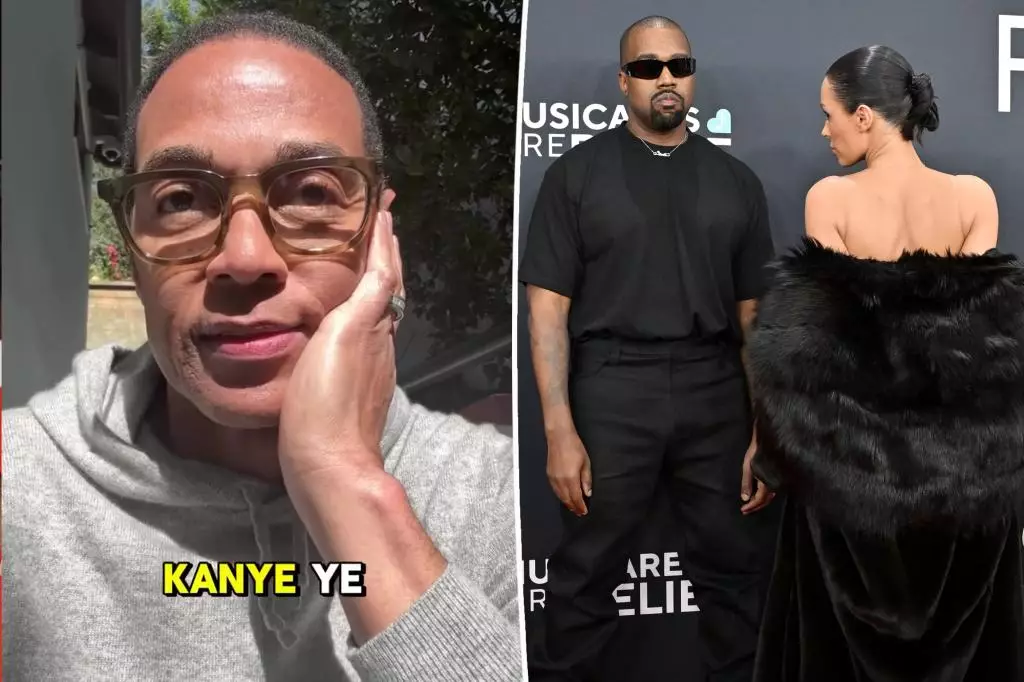In an unprecedented clash between two prominent figures, Don Lemon, a seasoned CNN anchor, has expressed his dismay at Kanye West’s use of derogatory language. This confrontation arose after West referred to Lemon as a “coon,” a term laden with historical significance and derogatory connotations within the Black community. The spark for this public feud was an unfounded rumor that West and Bianca Censori, his companion, had been removed from the Grammy Awards. Lemon, while admitted merely sharing information circulating in media circles, found himself in the crosshairs of West’s ire. This incident showcases not only the fragile nature of public discourse but also the weight of words and their impact on community bonds.
In today’s world, where social media amplifies messages and misinformation can spread like wildfire, Lemon’s response resonates deeply. “C’mon man, we’re both black men,” he remarked in a recent interview, emphasizing a call for mutual respect and understanding. This notion of respect is paramount; when influential figures resort to name-calling, it undermines the very essence of dialogue and reinforces negative stereotypes. Lemon’s plea serves as a reminder of the responsibility that comes with their platforms, urging for a dialogue that transcends petty conflicts and navigates towards constructive conversations.
Lemon’s defense against West’s allegations is not simply a matter of protecting his reputation; it speaks to the larger narrative of accountability amongst public figures. In a world where misinformation is rampant, journalists and influencers alike bear the burden of presenting truthful accounts. Lemon took to social media to clarify that he did not initiate the rumors regarding West’s alleged ejection from the Grammys. Instead, he asserted that he merely reiterated what was being reported and even sought to correct misinformation. This raises a critical question: How do we discern between genuine reporting and sensationalism?
Moreover, Lemon’s pointed jab at West—referring to his past political alignments as being influenced by “that ‘Make America Great Again’ hat”—highlights a deeper conflict within their respective identities as Black men in America. West’s previous support for Donald Trump has long been a contentious subject, drawing sharp divisions not only within the celebrity world but also in societal discussions about race and politics. This fracturing of identity, where cultural representation intersects with individual beliefs, adds a layer of complexity to their dispute.
The event that catapulted this controversy into the limelight was West and Censori’s unconventional appearance at the Grammys. Censori’s bold choice of a sheer dress ignited widespread speculation and media frenzy, earning her a plethora of opinions—from admiration to outcries of indecency. Lemon, who witnessed the unfolding spectacle, noted West’s acumen for marketing and promotion. It raises the question of the lengths to which celebrities will go to secure attention in an era driven by visual media and social presence.
Kanye West has often been described as a “master marketer,” adept at creating buzz around his persona and projects. The couple’s infamous red carpet moment, seemingly an attempt to mimic West’s latest artistic vision, blurs the lines between marketing strategy and genuine expression. However, the ensuing rumor of their expulsion appears to have backfired, fracturing the portrayal of their intent. This incident serves as a reflection of societal fascination with celebrity culture, where outrageous stunts can both captivate and repel audiences.
As this public spat continues to unfold, it becomes apparent that the core issue transcends personal grievances. It highlights the urgent need for unity and respect within the Black community, especially among those in spotlighted positions. In a time when societal tensions run high, the discourse between influential figures like Lemon and West should serve as a template for respectful dialogue, rather than a battleground for personal disagreements.
The exchange between these two personalities shines a light on the larger implications of their words and actions. With social media at the forefront of public engagement, there lies a clear opportunity for both Lemon and West to redirect the narrative toward constructive engagement, fostering a culture of respect rather than discord. As both parties navigate this public feud, perhaps they will come to recognize that mutual understanding and respect are the foundations upon which meaningful dialogue can be built. The hope is that this moment will catalyze not just personal growth for Lemon and West but a broader movement toward solidarity in addressing common issues facing their communities.

Leave a Reply